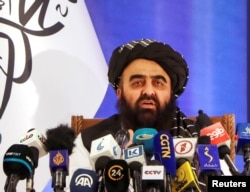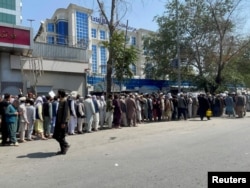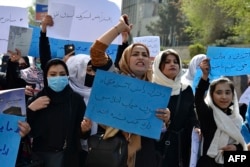Uzbekistan this week is hosting delegates from more than 20 countries and international organizations for a conference on Afghanistan, with envoys from the war-torn country’s ruling Taliban and the United States among the participants.
The two-day international event in the capital, Tashkent, which is scheduled to run until Tuesday, comes as the Taliban prepares to mark the first year of their return to power in Afghanistan. No country, however, has yet to recognize the hardline group’s male-only government in Kabul over human rights and terrorism-related concerns.
“The main objective of this conference is to combine all international efforts aimed at deterring the ongoing humanitarian crisis in Afghanistan by providing effective and emergency assistance to the people of Afghanistan and taking political and economic measures at the international level,” Javlon Vakhabov, the Uzbek ambassador to the U.S., told VOA.
“Another objective is about establishing an effective dialogue of the international community and developing consolidated positions in the fight against international terrorism,” Vakhabov said.
The diplomat stressed that Uzbekistan currently has no intention to recognize the Taliban and the “primary focus” of the Tashkent conference “is about the recovery of Afghan economy.”
Foreign Minister Amir Khan Muttaqi is leading the Taliban delegation at the conference.
The U.S. team is being led by Thomas West, special envoy for Afghanistan, who will be accompanied by Rina Amiri, the special envoy for Afghan women, girls, and human rights, according to a State Department statement.
It said the delegation would join the international community at the conference to underscore Washington’s “unwavering” support for the Afghan people and to call on the Taliban to fulfill their commitments.
“The international community is committed to a stable, peaceful, and inclusive Afghanistan that respects the human rights and fundamental freedoms of all Afghans — including women and ethnic and religious communities — and that prevents terrorist threat from Afghan soil,” the U.S. statement said.
US-Taliban talks
The statement added that the conference would be followed by direct talks between Taliban and U.S. delegates scheduled for Wednesday “to address the economic challenges faced by the Afghan people.”
Brian Nelson, Treasury undersecretary for terrorism and financial intelligence, would join the West for the meeting.
The negotiations between the U.S. and the Taliban are mainly focused on how to allow Afghanistan’s central bank to use some $7 billion in frozen funds held in the United States to help bring the troubled economy back on track and help the country deal with a hunger crisis stemming from years of war and persistent drought.
U.S. President Joe Biden issued an executive order in February aimed at unfreezing half that amount for humanitarian aid to benefit the Afghan people. The rest would be held for ongoing terrorism-related lawsuits in U.S. courts against the Taliban.
Washington says it is “working to help find an appropriate mechanism that can serve as a steward of the $3.5 billion that President Biden set aside.” But the Taliban demand the entire sum be released, insisting the money belongs to Afghanistan.
“The Taliban’s ongoing and expanding restrictions on the rights of Afghan women and girls was a central focus of U.S. officials’ engagement with the Taliban,” the State Department said of last month’s two-day meeting in Qatar.
The Islamist group retook control of Afghanistan on Aug. 15, 2021, when the Western-backed government collapsed and all U.S.-led foreign troops withdrew from the country after nearly 20 years of war with the Taliban.
The Islamist rulers have since significantly rolled back women’s rights to work and education, and barred most teenage girls from resuming secondary school. They have defended their policies as in line with Afghan culture and Shariah or Islamic law. Women working in the public sector have been told to stay at home, with the exception of those who work for the ministries of education, health and a few others.
The United States defends its engagement with the Taliban, citing deteriorating economic and humanitarian conditions in Afghanistan. Washington says “a policy of pure isolation” cannot help it achieve its objectives.
Donal Lu, a senior U.S. diplomat for regional affairs, told VOA earlier this month, however, that no foreign government, including Russia, China and Iran, is contemplating legitimacy for Taliban rule in Afghanistan.
The U.N. lists Afghanistan among the world’s largest humanitarian emergencies, where it estimates 18.9 million people — nearly half of the population — could be acutely food insecure between June and November 2022.
The international community is also pressing the Taliban to govern the conflict-torn South Asian nation through an inclusive political system where all Afghan groups have their representation.
Taliban leaders have ignored the criticism, maintaining that their government is inclusive and brought peace to the entirety of Afghanistan in a short period of time.
The United Nations, in an annual report issued this month on the status of human rights in the country, lamented the erosion of women’s rights, which has been one of the most notable aspects of the Taliban takeover.
“Since 15 August, women and girls have progressively had their rights to fully participate in education, the workplace and other aspects of public and daily life restricted and in many cases completely taken away,” the report said.
VOA Afghan Service contributed to this report.



